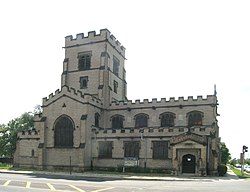Trinity Episcopal Church (Detroit)
Trinity Episcopal Church | |
 | |
| Location | 1519 Martin Luther King Boulevard Detroit, Michigan |
|---|---|
| Coordinates | 42°20′29″N 83°4′22″W / 42.34139°N 83.07278°W |
| Built | 1890 |
| Architect | George D. Mason & Zachariah Rice |
| Architectural style | English Gothic |
| NRHP reference No. | 80001929[1] |
| Significant dates | |
| Added to NRHP | May 22, 1980 |
| Designated MSHS | August 3, 1979[2] |
Trinity Episcopal Church is located at 1519 Martin Luther King Boulevard in the Woodbridge Historic District of Detroit, Michigan. The church was designated a Michigan State Historic Site in 1979[2] and listed on the National Register of Historic Places in 1980.[1] It is now known as Spirit of Hope.
History
The Epiphany Reformed Episcopal parish was founded in 1878 as a place where Anglicans not pledged to the Episcopal bishop of Michigan might worship.[3] In 1880, the congregation built a small frame church, and in 1889 changed their name to Trinity Episcopal.[3]
James E. Scripps, owner of The Detroit News, was a member of the Trinity congregation. Scripps was born in London,[3] and developed a fascination with historic English churches. He commissioned sketches of churches in England,[3] and in 1893 put up $55,000 to build the current church building.[4]
In 1896, Trinity members voted to unite their church with the Episcopal diocese of Michigan.[3] In 1926, the parish house, which includes a chapel, dining room, gymnasium, offices and classrooms was constructed.[4] As the neighborhood around Trinity changed, the church reached out to new constituents, including the Irish community.[5] However, the declining population of the surrounding area led to a decline in the congregation.[5]
In 2001, the nearby Jeffries Housing Projects were torn down; the Faith Memorial Lutheran Church, founded in 1956 to serve the community, found itself with a drastically reduced congregation.[5] The congregations of Faith Memorial Lutheran and Trinity Episcopal began exploring the concept of merging, and in April 2006, the two joined to become the Spirit of Hope.[5]
In 2007, Kathleen Brennan began the Spirit of Hope Urban Farm which was featured in the September/October 2011 Natural Home & Garden magazine.[6]

Architecture
James E. Scripps commissioned architects Mason & Rice to design this English Gothic-style church.[4] The floorplan of Trinity Episcopal Church is laid out in a cruciform pattern. The walls are two feet thick Trenton limestone, and the root is sheathed with copper.[4] Smooth brown limestone used as trim offsets the white limestone used for the bulk of the walls.[3] The 85-foot-tall (26 m) central, supported by stone arches and buttresses, tower contains ten bells. The exterior holds over two hundred carvings, including gargoyles that serve as water drains.[4] Inside the sanctuary, ten stone angels supporting the nave beams face inward; several windows contain stained glass, including a Tiffany, a LaFarge, and a window over the altar was created by Franz Mayer & Co. of Germany.[4] A 1200-pipe organ manufactured by the Jardine Company of New York City is also inside.[4]
References
- ^ a b "National Register Information System". National Register of Historic Places. National Park Service. April 15, 2008.
- ^ a b "Trinity Episcopal Church". Michigan State Housing Development Authority. Retrieved September 3, 2010.
- ^ a b c d e f Trinity Episcopal Church/ Spirit of Hope from Detroit1701.org
- ^ a b c d e f g Historic Building from Spirit of Hope
- ^ a b c d History from Spirit of Hope
- ^ Greening Detroit: Spirit of Hope Urban Farm Brings Bounty to the Motor City, Kelli B. Kavanaugh, Natural Home & Garden, September/October 2011 (retrieved 28 January 2012)
External links
- Churches in Detroit
- Midtown Detroit
- Episcopal churches in Michigan
- Churches completed in 1890
- Churches on the National Register of Historic Places in Michigan
- Michigan State Historic Sites in Wayne County, Michigan
- National Register of Historic Places in Detroit
- Religious organizations established in 1878
- 1878 establishments in Michigan
- Towers in Michigan
- 1890s architecture in the United States
- Gothic Revival churches in Michigan



